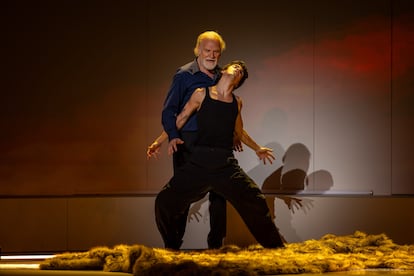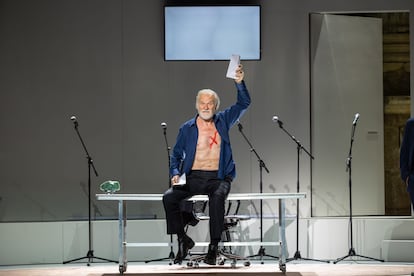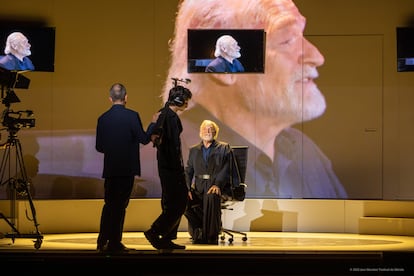'Memoirs of Hadrian': Lluís Homar resurrects the emperor in the Roman theater of Mérida

A type of opinion piece that describes, praises, or criticizes, in whole or in part, a cultural or entertainment work. It should always be written by an expert in the field.

The ancient stones of Mérida's Roman theatre were still smouldering from the day's heat when Lluís Homar appeared on stage. It was already a quarter to eleven at night, the official start time for performances at the classical theatre festival held every summer at the historic venue. This Wednesday, the actor premiered an adaptation of Memoirs of Hadrian , one of the pinnacles of 20th-century historical fiction. It is the work that brought Marguerite Yourcenar not only literary prestige but also fame and popular success, as it is one of the most translated and best-selling titles since its publication in 1951. It aroused such devotion that it has inspired numerous creations in different formats, including an opera by Rufus Wainwright .
But the structure of the text, presented as a fictional letter from the Roman Emperor Hadrian (76-138 AD) to his young successor Marcus Aurelius, makes it especially suitable for adaptation for the stage, as it is a kind of interior monologue in which Hadrian reviews his life while reflecting on power, politics, art, philosophy, love, and death. A torrent of thoughts, confessions, frustrations, desires, and fears that is tremendously tempting for an actor, but not within everyone's reach. It requires a great deal of experience, presence, and diction to sustain it alone without losing the audience's attention, as well as "hours and hours of memorization," as Homar confessed after the premiere.
The Barcelona-born performer showed the 2,000 spectators who attended the premiere in Mérida that he has all that and more: at 68, he has accumulated not only professional experience but also the life perspective to put himself in Adriano's shoes, precisely at the moment Yourcenar described him: "That age when life is an accepted defeat."

Homar is on stage every moment of the hour-and-a-half performance, and the only voice heard is his own. But he is not always alone. A chorus of five performers accompanies him in most scenes, evoking situations or characters mentioned by the emperor. Trajan and his wife, Plotina; his political enemies, Celsus and Quietus; advisors, teachers, tutors, friends, and, above all, his young lover, Antinous, played with great expressive force by dancer Álvar Nahuel, who, alongside Homar, stars in one of the most intimate moments of the show. It is also one of the best: it enhances the contrast with the power-hungry and sometimes cruel Hadrian, although the reflective and self-critical Hadrian also emerges.
But this isn't a Hadrian in a Roman toga like the one seen in Mérida in 1998 , played by Pepe Sancho with staging by Maurizio Scaparro. The Roman director had premiered Memoirs of Hadrian in 1989 in the ruins of Hadrian's Villa in Tivoli, where the emperor spent his final years, with an Italian cast and a version by Rafael Azcona. The success of that adventure encouraged him to take it up again nine years later with Pepe Sancho and other Spanish performers, which was then seen at the Grec in Barcelona and Almagro.
The newly released production is very faithful to Julio Cortázar's canonical translation of Yourcenar's novel, with carefully measured cuts by playwright Brenda Escobedo. But the stage proposal detaches itself from the literal meaning of the text to engage with contemporary audiences, as explained by the production's director, Beatriz Jaén, after the premiere in Mérida: "I see Hadrian as a modern-day leader with a lot of power. A kind of US president." Jaén, 37, is an emerging figure on the current Spanish stage and last year staged an adaptation of Carmen Laforet's Nada , another emblematic novel, for the National Drama Center.

That's why the set design doesn't evoke a Roman villa, but rather plays with the past and present, as Yourcenar herself did in the novel: the imposing Corinthian columns of the Mérida theater are always present in the background; while on stage, a recreation of what could be the office of a president of a country in the present day, oval-shaped like that of the United States. The costumes follow the same pattern: contemporary-style clothing and business suits, with a toga added to the left side in some scenes. Television screens, cameras, microphones, electronic music, cables, and video projections amplify gestures or suggest emotional states.
At the start of the show, all this artillery is jarring and creates too much stage noise. But as Homar takes ownership of the character and lets himself be carried away by Yourcenar's poetry, Hadrian's voice becomes more audible and the author's words become more savored. It is in the most intimate moments that we glimpse the Hadrian she set out to dissect when writing the novel. She explained this by quoting a phrase she read in a letter from Flaubert: "When the gods no longer existed and Christ had not yet appeared, there was a unique moment, from Cicero to Marcus Aurelius, when there was only man."
Following its premiere in Mérida, where it will run until Sunday, this new Memoirs of Hadrian will be at Madrid's Marquina Theater from September 19 to October 12. It will then embark on a tour throughout Spain, eventually completing a season at Barcelona's Romea in the spring.
EL PAÍS


